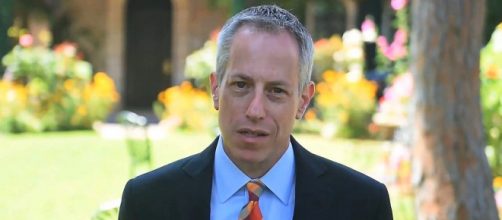Career diplomat Michael Ratney has been chosen by President Joe Biden to be the next U.S. ambassador to Saudi Arabia, according to an April 22 White House statement.
The announcement of Ratney's selection comes less than a month after The Guardian reported that U.S.-Saudi relations were at "an unprecedented low." Saudi Arabia and the United Arab Emirates (UAE) had refused to help Biden cope with one consequence of the War in Ukraine: soaring oil prices, the paper said. Both Arab nations had been "unusually frank about their refusal to step in" and had even refused to take phone calls from Biden, wrote the paper's Middle East correspondent Martin Chulov.
Ratney had recently served as Chargé d’Affaires at the U.S. Embassy in Jerusalem and before that he had been U.S. Consul General in Jerusalem, the White House statement said. It added that Ratney was currently Acting Deputy Director of the U.S. Department of State’s Foreign Service Institute. A speaker of French and Arabic, Ratney had previously served as Dean of the School of Language Studies at the Foreign Service Institute, the White House said.
Ratney had also been U.S. Special Envoy for Syria and Deputy Chief of Mission at the U.S. Embassy in Doha, Qatar, the White House said. The statement announcing Biden's selection of Ratney can be found at the White House website.
A 'soft-spoken' diplomat
"Mr Ratney is known for his soft-spoken and diplomatic approach to handling intricate policy issues," said Joyce Karam, an adjunct professor at George Washington University. Writing in The National, she noted that it had taken Biden more than a year to select an ambassador to Saudi Arabia.
"The diplomatic void in Saudi Arabia has contributed to growing distance between the kingdom and the Biden administration," she said. Karam quoted former U.S. ambassador to Yemen Gerald Feierstein as calling Ratney "somebody who is extremely well qualified for the job (and) can bring strong diplomatic skills to the table to help address some of the challenges in the relationship."
NEW: Prez Joe Biden Nominates Career Diplomat Michael Ratney Ambassador to #Saudi Arabia. Fluent Arabic Speaker, served in Jerusalem, Baghdad, Beirut...https://t.co/zsKNWT8TqS
— Joyce Karam (@Joyce_Karam) April 22, 2022Saudis to get first career diplomat as U.S. ambassador in 30 years
Unless the Senate refused to confirm his nomination, Ratney would be the first professional diplomat to serve as U.S.
ambassador in Saudi Arabia in 30 years, Gulf News noted. Feierstein told Karam that Saudis actually preferred "to have a political appointee with links to the president."
Gulf News recalled that for the first two years of Donald Trump's presidency, there had been no U.S. ambassador in Saudi Arabia. One of the reasons for the souring of relations between the United States and Saudi Arabia had been Biden's decision to discontinue arms sales to the Saudis, Gulf News added.
#JoeBiden picks career diplomat Michael Ratney as envoy to #SaudiArabia
If confirmed he would be 1st career diplomat to serve as ambassador to #Riyadh in 3 decadeshttps://t.co/Rb0mr5Vnmm
— Gulf News (@gulf_news) April 23, 2022Saudi human rights abuses strain relations with U.S.
The Hill noted that Saudi human rights abuses had strained the relations between that country and the United States.
The news outlet recalled that Biden had promised to hold Saudi Prince Mohammed bin Salman to account for the killing of journalist Jamal Khashoggi.
Saudi Arabia has also been criticized for its recently announced decision to repatriate four Uyghurs to China against their will. On April 13, Amnesty International reported on its website that the four had been informed that they would fly out of Saudi Arabia to China that night. Among those being repatriated were a 13-year-old girl and her mother, Amnesty International said. The human rights organization urged Saudi Arabia not to return the Uyghurs "to a place where they may face persecution."
🚨 This 13-year-old girl is among 4 Uyghurs facing deportation to China, Saudi Arabia must NOT send them back to a place where they may face persecution pic.twitter.com/FKfidXAynH
— Amnesty International USA (@amnestyusa) April 18, 2022"The Saudi-US relationship is in the throes of a crisis," wrote Mohammed Alyahya, in The Jerusalem Post on March 28.
The American-educated former editor of Al Arabiya English pointed to the nuclear deal with Iran as the cause for the demise of relations between the U.S. and Saudi Arabia.
The agreement had been negotiated by Barak Obama and cancelled by Donald Trump, noted Steve Chapman in a commentary in the Chicago Tribune. Chapman called upon Biden to negotiate with the Iranians for a return of the agreement. Alyahya warned that the agreement had paved "a path for Iran to a nuclear bomb."


